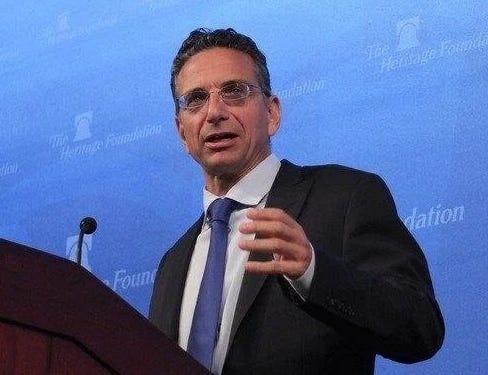Stage right
Freedom Conservatives offer a compelling vision of America’s future
The Heritage Foundation’s Tucker Carlson problem shows no signs of going away. That’s bad news for the organization, its current and former employees, and the American Right as a whole.
The increasingly erratic Carlson is no conservative. He abandoned our movement long ago for nationalist populism. He praises foreign dictatorships, whitewashes America’s enemies, vilifies our friends, and calls market capitalism the “enemy of a healthy society.”
Carlson began his dark turn many years ago. But Heritage continued to sponsor his show and prominently featured Carlson’s endorsement in fundraising and promotional materials. The think tank’s CEO, Kevin Roberts, still refuses to cut ties with a crank whom National Review recently labeled “America’s leading purveyor of antisemitic ideas.”
Freedom Conservatives hope that cooler heads prevail. Many of our signatories are actively engaged in the public conversation about Carlson and Heritage. In the Washington Examiner, for example, Tiana Lowe Doescher decried “the suicidal erosion of the Heritage Foundation’s practical political influence.” Joel Griffith, a senior fellow at Advancing American Freedom and Heritage alum, called Roberts’s stance “disheartening, outrageous, and sobering.”
But FreeCons also think it essential to point out that many other leaders and organizations haven’t been seduced into abandoning their principles. They are doing excellent work — in politics and public policy, as journalists and commentators, as authors and scholars, and as educators, trainers, litigators, donors, artists, and grassroots activists.
Some are in Washington. Others work in state capitals and local communities across the United States, where they’ve built thriving institutions and won many victories in education reform, fiscal policy, health care, housing, energy markets, and other areas.
To develop and sustain a conservatism capable of winning and wielding power within America’s constitutional order, FreeCons must continue to build new institutions and revitalize older ones. We must articulate a compelling vision of America’s future, applying timeless wisdom and appealing to the better angels of human nature, while also offering specific solutions to our country’s most-challenging policy problems.
And we must call out those who purport to stand for limited government, federalism, and free enterprise but in practice fall for activist government, centralism, and protectionist plots against the public interest.
Today we feature FreeCon signatories engaged in each of these important tasks.
Groypers at the gate
Peter Laffin is the “In Focus” editor and deputy editor of commentary at the Washington Examiner. He’s also a FreeCon signatory.
Laffin was formerly a staff writer for the National Catholic Register and has written for the Catholic Herald UK, RealClearPolitics, and RealClearReligion. He’s also offered analysis on Fox News, EWTN, and Sirius XM’s POTUS.
In a recent Examiner column, he wrote that Tucker Carlson’s decision to invite white nationalist Nick Fuentes onto his show “thrust the fringe figure into the heart of the New Right mainstream.”
Many of its leaders and influencers appear to be “adopting an increasingly explicit ‘no enemies to my right’ posture,” Laffin wrote. “This means that everyone on the Right is to be considered a ‘friend,’ including Fuentes, who has called for executing Jews and their co-conspirators, while everyone not on the Right is an ‘enemy.’”
Laffin also cited a recent case of Vice President J.D. Vance being confronted by a student expressing antisemitic tropes at a Turning Point USA event.
“Instead of pushing back on any of the lunacy, lies, and antisemitic filth inherent in the question,” Laffin wrote, “Vance simply assured the questioner that the Jews had no control over Trump — but not for a lack of trying.
“‘When people say that Israel is somehow manipulating or controlling the President of the United States — they’re not controlling this president,’ Vance replied, ‘which is one of the reasons why we’ve been able to have some of the success that we’ve had in the Middle East.’”
“No one was more pleased with the TPUSA event than Fuentes himself,” Laffin concluded.
Patients should decide
Caleb O. Brown is the Chief Executive Officer of the Bluegrass Institute, a state policy think tank based in Kentucky. He’s also a FreeCon signatory.
Formerly the director of multimedia at the Cato Institute, he hosted the Cato Daily Podcast for nearly two decades.
Brown previously worked at 840 WHAS-AM, Snitch Newsweekly, and WLKY in Louisville. His commentaries have appeared in Investor’s Business Daily, New York Press, and The Washington Times, among other outlets.
In a recent Louisville Courier Journal piece, he urged Kentucky to follow the lead of other states that have reformed their certificate-of-need regulations to foster choice and competition among hospitals and other medical establishments.
“Proponents of CON laws claim health care providers need monopoly power to remain financially viable,” wrote Brown and his coauthor Jaimie Cavanaugh, state policy counsel at the Pacific Legal Foundation.
“However, nearly 40% of the U.S. population lives in a state with no — or limited — CON laws, allowing economists to compare outcomes. As expected, restricting health care supply increases costs, reduces access, and lowers quality.”
“The federal government agrees,” they observed. “Every presidential administration since Reagan’s has urged states to curtail CON laws, which are particularly harmful in rural and underserved areas desperate for more care.
“Patients and providers — not government officials — should decide when care is needed.”
Our age of rage
Joseph Loconte is a Presidential Scholar in Residence at New College of Florida and the C.S. Lewis Scholar for Public Life at Grove City College. A senior fellow at the Trinity Forum, Loconte is also a FreeCon signatory.
Among the books he’s authored is the bestseller A Hobbit, a Wardrobe, and a Great War: How J.R.R. Tolkien and C.S. Lewis Rediscovered Faith, Friendship, and Heroism in the Cataclysm of 1914-1918.
Loconte’s follow-up book The War for Middle-earth: J.R.R. Tolkien and C.S. Lewis Confront the Gathering Storm, 1933–1945 is about to be published.
In a recent National Review piece, he argued that the friendship between Tolkien and Lewis, and the literary epics they produced, offer us essential lessons to apply in our current age of rage.
“Their most beloved stories — The Hobbit, The Lord of the Rings, The Ransom Trilogy, The Chronicles of Narnia — upheld the irreducible dignity of the individual,” Loconte wrote.
“Against the literary establishment, they reclaimed the concept of heroism and reinvented it for the modern mind: Their unlikely protagonists include the children of Narnia and the homely inhabitants of the Shire.”
“During the crisis years of 1933 to 1945, when the world descended into an abyss of grievances, propaganda, and state-sanctioned violence, J.R.R. Tolkien and C.S. Lewis stood together in the breach. They offered a vision of human life — rooted in a deeply Christian outlook — that embraced humility, self-denial, and the rejection of worldly power.”
In the mix
• At RealClearMarkets, FreeCon signatory Donald Bryson urged American leaders not to mimic the industrial policies of China.
“Economic nationalism can feel comforting, but it dulls the edge of our competitiveness,” wrote Bryson, CEO of the John Locke Foundation. “President Ronald Reagan warned in 1987 that when nations ‘impose tariffs on foreign imports,’ they may seem to be acting patriotically, but protectionism breeds complacency, inefficiency, and, ultimately, job losses. His warning proved timeless: markets reward innovation, not insulation.
“To lead in a free global marketplace, the United States must keep its own economy free, open, and disciplined at home.”
• In the Washington Examiner, Kevin Kosar praised a new book by fellow FreeCon signatory Kurt Couchman describing a practical balanced-budget amendment.
The proposal would require a balance of expenditures and revenues over 10 years and permit Congress to engage in deficit spending so long as two-thirds of each chamber support doing so.
“His balanced budget proposal would not force Congress to retire all the federal debt, which would necessitate severe tax increases and spending cuts,” wrote Kosar, a senior fellow at the American Enterprise Institute.
“Rather, it would curb the government from adding to the national debt over the long run. Thus, the size of the national debt would decline relative to gross national product, which would decrease the peril of a debt crisis, wherein investors and foreign nations refuse to purchase U.S. bonds.”
• In Law and Liberty, FreeCon signatory Samuel Gregg criticized the return of “do it yourself economics,” with both left-leaning progressives and right-leaning populists inventing concepts that bear no relationship to economic reality.
It’s a development that “translates into boom times for interventionists of all political stripes,” wrote Gregg, president of the American Institute for Economic Research.
From price controls to protectionism, do-it-yourself economics endangers the public good. Opposing it requires “a willingness to be unpopular in many circles,” he concluded. “In populist times, however, the choice to bear witness to unpopular truths is often the difference between chaos and civilization.”
• At The Dispatch, FreeCon signatory Jonathan Adler analyzed the oral arguments made before the U.S. Supreme Court on the legal challenge to President Trump’s tariffs.
“Had the president attended the argument in person, as he had previously threatened to do,” wrote Adler, the Tazewell Taylor Professor of Law and William H. Cabell Research Professor at the William & Mary Law School, “he may have been heartened to hear his solicitor general repeat his pronouncements about the need for powerful tariffs, but also dismayed that the justices he appointed to the court did not seem wholly persuaded.”
“While a majority of justices have been willing to insulate the president’s initiatives from lower-court orders on the interim docket, it seems unlikely that there are five justices willing to uphold the Liberation Day tariffs.”



